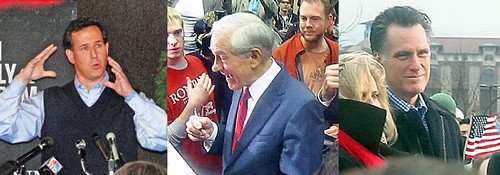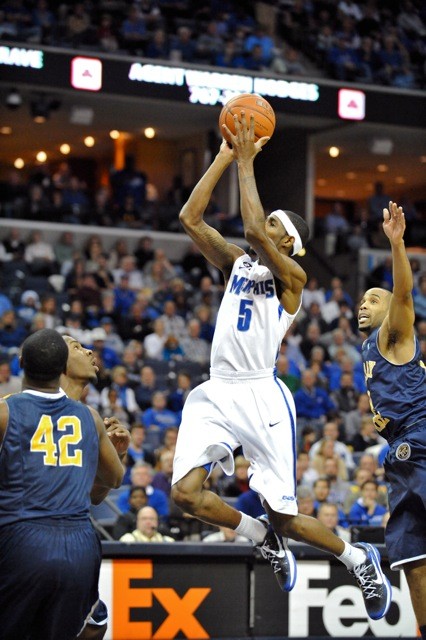
- jb
- Santorum, Paul, Romney and Wife Ann in Iowa
A Memphis friend seemed to look at me as if I might be crazy when, at a New Year’s gathering, I suggested that former Pennsylvania Senator Rick Santorum might finish in first place among Republican presidential contenders in this week’s Iowa caucuses. Or maybe she was just horrified.
Actually, I hedged a bit on my forecast, saying that either Santorum or former Massachusetts governor Mitt Romney could come out ahead, with the other in second place, a hair above Texas libertarian congressman Ron Paul, a feisty septuagenarian who has a dedicated following that carries over from presidential season to presidential season, looking cultish or mainstream as the times define.
This year the latter was the case, as Dr. Paul (both he and commentators periodically emphasize his medical background) went into the final week looking like a possible winner himself. Accordingly, he did what every other candidate has done whenever they began to look viable. He moved toward the center.
When I saw him at a Sioux City rally last Friday night, Rep. Paul was not playing take-back with any of his somewhat idiosyncratic assertions (regarding the villainy of the Federal Reserve system, for example), but his rhetoric was shaded more toward the forefathers and their regard for liberty — almost as if he was angling for his own place on a coin (preferably a gold one, given his predilections for a return to the gold standard).
One last note about Paul: his potential for winning was dimmed somewhat by the media revelations this past week that a political/economic newsletter he once published had proclaimed sentiments that were racist, homophobic, anti-Semitic, and redolent of 9/11 conspiracy theory. (For the record, Paul disclaimed personal authorship.)
Yet his residual potential was advertised by the fact that, as the crowd gathered for a Romney rally in West Des Moines that morning, a man and a woman wearing Romney stickers and standing just behind me were spending much of their time extolling Ron Paul and his minimal-government c redo, as if their hearts belonged with the Good Doctor even as their heads inclined toward presumed national frontrunner Romney as their party’s best bet for beating President Obama.
Interestingly, too, these two Iowans seemed to side with Paul in his antagonism toward foreign military commitments — an indication that not just Democrats and commentators but some heartland GOP voters themselves are intrigued by this aspect of the Paul canon.
So why, as we were saying, Santorum and Romney? Romney first: He has a personal fortune and the largest war-chest of any candidate, inasmuch as he’s been running for president since losing out to John McCain for the Republican nomination in 2008. He has used those resources to create a Super-PAC (a term of the nonce) called “Restore Our Future” which has pumped out attack ads against any candidate who threatened to rival or exceed him.
In sequence, that has been Minnesota congresswoman Michelle Bachman (who won the August Iowa Straw Poll); Texas governor Rick Perry (who entered the contest on a white stallion last summer, then promptly fell off his mount via non-stop gaffes in candidate debates) , ex-Godfather Pizza chief Herman Cain, this season’s novelty candidate who ended up with so many female co-respondents going public as to make Bill Clinton look like a Trappist monk and had to drop out; and former Speaker of the House Newt Gingrich, whose campaign had first self-destructed, then rose to dramatic heights just within the last month, then was torpedoed into relative insignificance again by attack ads from Romney and virtually everybody else concerning his personal peccadilloes and multiple deviations from Republican orthodoxy.
Romney seems not to have suffered by virtue of his heterodox religion, Mormonism, though this is conceivably a latent issue. He has held steadiest of all the candidates in various pollings, with few dramatic ups and downs. He has always been at or near the top. That is partly due to his juggernaut of an organization, but partly, also, to a political rhetoric that is clearly crafted to be all things to all people. Not quite a moderate, Romney has been a chameleon, and the rap against him is that, despite a record of success as a chief executive in and out of politics, he lacks core convictions.
The chief exhibit for this shortcoming is perhaps the disingenuous dance he has had to do to join the rest of the GOP candidates in denouncing “Obamacare” even though the President’s health-care plan is virtually the spitting image of one crafted by Romney himself as governor of Massachusetts.
Yet, to give him his due, Romney, more than the others, has pledged to work across the political aisle to get results. He did so again at the West Des Moines rally.
But so has Santorum, fairly consistently, though his declarations to that effect during the endless series of GOP candidate debates were generally overlooked — due both to his clear second-tier status during those affairs and to the sometimes shrill emphasis he gave his hard-core social conservative views. This is the man who once affrighted a reporter some years ago by going ballistic and proclaiming the specter of “man-on-dog” sex during a philippic against the decline of sexual mores in our time. `
But, uniquely among the Republicans in this presidential field, Santorum deigns to add the suffix “-ic” to the name of the political opposition party and makes much of the fact that, before losing his Senate seat badly in 2006, he had prevailed in two prior elections in heavily Democratic Pennsylvania. And he could legitimately point to bills he had co-sponsored with Democrats.
In a well-attended appearance last Thursday in Muscatine, a suburb of Davenport, Santorum won praise for his performance from no less an attendee than Ed Schulz, the firebrand commentator who toils for MSNBC, the “liberal” cable channel. On that occasion, conscious that he had somehow, miraculously won a place on the pendulum swing at just the right time (his chief arch-conservative rivals having all fallen away), Santorum seemed intent on looking as mainstream as possible.
He had even engaged in a gentlemanly dialogue with a woman, evidently a Lesbian activist, who baited him on his stand against same-sex marriage. After making his usual fervent defense of traditional marriage and positing it as a necessary element to generate a strong economy, Santorum actually congratulated the woman for advancing her position and entering into a dialogue on the matter.
Yet he is still far to the right on the social spectrum, and evangelical Iowans know that. Hence his current standing in their eyes as an alternative to Romney, whom they clearly do not trust.
Quickly regarding the rest of the field: Gingrich has crested, and his curve is down, though he appears intent on soldiering on into New Hampshire, which holds the first primary next week. Perry may be there, too, as much on the strength of his still-considerable campaign treasury and his matinee-idol looks (giving him good crowds and an abundance of autograph-seekers) as anything else. He may even come in for a little bump upward in the Iowa results.
The most obvious loser in Iowa is Michelle Bachmann, a candidate who has dropped steadily since her straw-poll victory there in August and an arch-conservative who seems incapable of even faking any mainstream sentiments. (A recent talking point: a proposed bill to strip American-born children of illegal aliens of their citizenship rights.) At her stops last week, the diminutive Bachmann drew almost no onlookers except for a media remnant that badgered her about when and how she would bring her campaign to an end.
“No softballs? She couldn’t get even a single softball?” a dazed campaign aide exclaimed at the close of such a press battering in the west Iowa hamlet of Early. And that said it all.




